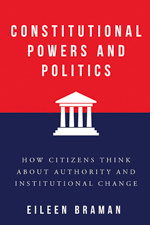Today, we are happy to bring you our conversation with Eileen Braman, author of Constitutional Powers and Politics: How Citizens Think about Authority and Institutional Change.
What inspired you to write this book?
Politics in this new millennium is shaped by competing visions of what the Constitution forbids and requires. I am interested in how citizens think about government authority considering elite partisan rhetoric, their policy opinions, and their understandings of how constitutional rules influence official action. Often people don’t know a lot about the Constitution and so they have to rely on experts. It seemed important to explore how citizens think about those constitutional authorities as well. Finally, there has been a good deal of talk about changing democratic institutions like the Supreme Court. I am curious about why citizens might embrace, or resist, proposals to make fundamental changes to governing bodies in our democracy.
What did you learn and what are you hoping readers will learn from your book?
I learned that people are not passive in how they think about government action and change. Their feelings about issues, officials, and experts matter a great deal. My findings also demonstrate that the frustrations many citizens feel with the way democratic institutions are currently operating can be channeled into support for change that can make our democracy work better. Thomas Jefferson talked about how governing systems must evolve with changing times and advances in knowledge in order to survive. This kind of change can be difficult and scary, but I hope readers agree that it might be time to have a meaningful conversation about things we can do to improve how our democratic institutions serve citizens and society.
What surprised you the most in the process of writing your book?
In writing this book I learned that there was much more support for changes to our governing system than I expected. I think it’s also clear that how elites make arguments for institutional change matters a great deal. Ironically, focusing on what is not working may be the best way to convince citizens to take a risk, if you can show them how making changes to the system can better serve their personal and societal interests.
What’s your favorite anecdote from your book?
Some of the open-ended responses citizens wrote to questions asking them how they felt about legislative action on immigration and gun control were very interesting. From “funds for Americans only” on the Right, to “f**k the Second Amendment” on the Left, people were not afraid to say how they felt. There were some thoughtful responses as well, demonstrating understandings of federalism and constitutional history that were often quite different.
What’s next?
I am looking forward to spending some quality time with family before embarking on my next major research project.





